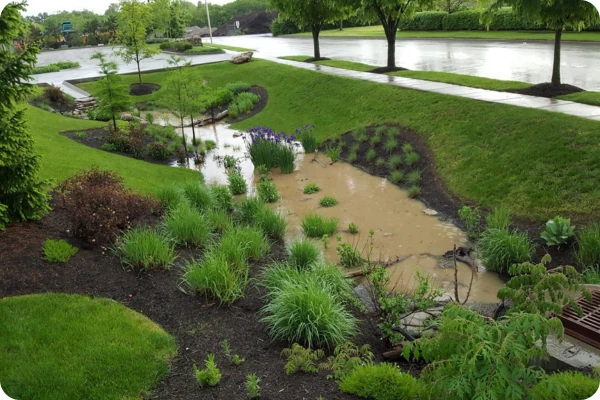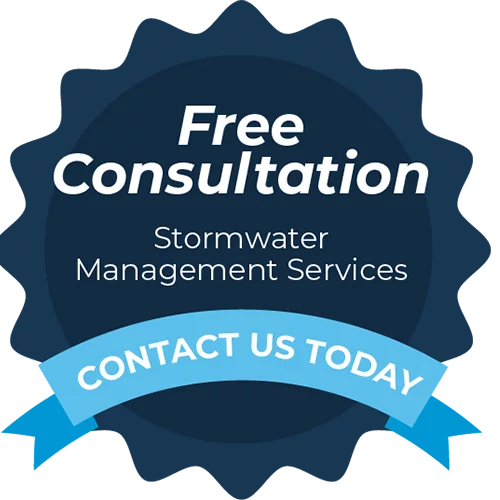As climate change intensifies and urban development accelerates, traditional stormwater systems are being pushed beyond their limits. The future of stormwater management lies in a combination of smart technologies and sustainable solutions that protect the environment, support public health, and meet regulatory demands.
In this blog post, we’ll explore how advanced technologies and green infrastructure are transforming stormwater management for municipalities, commercial properties, and industrial sites alike.

Why Stormwater Management Needs to Evolve
Stormwater runoff is more than just excess rain – it’s a complex environmental challenge. Urban surfaces like roads, parking lots, and rooftops prevent water from soaking into the ground, leading to:
- Flooding
- Erosion
- Polluted waterways
- Infrastructure damage
Outdated systems can’t handle today’s precipitation patterns. That’s where smart stormwater management and sustainable design come in.
Smart Stormwater Technologies: The Digital Upgrade
1. Real-Time Monitoring & Data Analytics
Sensors and IoT (Internet of Things) devices are being used to monitor:
- Water levels in detention/retention ponds
- Flow rates through storm drains
- Water quality indicators like turbidity, pH, and pollutant loads
This data enables proactive maintenance, early flood warnings, and informed infrastructure planning.
2. Automated Control Systems
Smart valves and gates can dynamically adjust water flow based on weather forecasts and current runoff levels. These systems help:
- Reduce overflow during heavy rain
- Optimize water reuse
- Minimize downstream impacts
3. AI and Predictive Modeling
Artificial Intelligence (AI) is now used to model stormwater behavior based on historic rainfall data, land use, and climate projections. This supports:
- Better stormwater system design
- Cost-effective retrofits
- Long-term climate resilience planning
Sustainable Stormwater Solutions: Nature-Based Innovation
1. Green Infrastructure
Unlike conventional “gray” infrastructure (pipes and culverts), green infrastructure mimics natural hydrology. Examples include:
- Bioretention cells (rain gardens): Use vegetation and soil layers to filter and absorb runoff
- Green roofs: Absorb rainfall and reduce heat island effect
- Permeable pavement: Allows water to soak through, reducing surface runoff
2. Constructed Wetlands
Engineered wetlands provide both water quality treatment and habitat benefits. They are effective at:
- Removing nutrients and heavy metals
- Slowing down runoff
- Recharging groundwater
3. Rainwater Harvesting Systems
These systems collect and store rainwater for non-potable uses such as:
- Landscape irrigation
- Cooling systems
- Toilet flushing
By reducing demand on municipal systems, they help manage stormwater at the source.
Integrating Smart & Sustainable Approaches
The most effective stormwater management strategies combine technology with ecological design. For example:
- A smart bioretention facility can include sensors to monitor performance and trigger alerts for maintenance.
- Permeable pavement with real-time moisture sensors can inform snow removal and de-icing protocols.
These hybrid systems deliver both environmental benefits and operational efficiencies.
Benefits for Property Managers, Municipalities & Developers
Adopting future-focused stormwater solutions can lead to:
- Regulatory compliance (e.g., MS4, NPDES)
- Cost savings through reduced flooding and maintenance
- Improved site aesthetics and property value
- Enhanced ESG reporting and community goodwill
Challenges and Considerations
Transitioning to smart, sustainable stormwater systems does come with challenges:
- Upfront costs for technology and infrastructure
- Integration with legacy systems
- Need for technical expertise and training
However, many jurisdictions offer grants, incentives, or stormwater credits to support adoption.
Looking Ahead: The Future Is Resilient
The future of stormwater management is here—and it’s smarter, greener, and more adaptive. Whether you’re a civil engineer, urban planner, or property manager, investing in innovative stormwater solutions is essential for building climate-resilient communities.
Ready to modernize your stormwater strategy?
Partner with a team that understands both the technology and the science of sustainable stormwater management.
👉 Contact us today at (410) 231-3455 or schedule a consultation online.
Real Results
iStormwater LLC was an excellent choice. They made the process of the Stormwater pond repairs seamless. They took charge of the project and got the project approved and passing the inspection. We highly recommend them and would use them again.
Incredible stormwater management service. The owner John consulted on a property I manage and ended up saving us thousands of dollars in environmental fees from the government. Now, our property is compliant with the EPA and we have a great partner to keep us maintained on stormwater regulations over time.
So helpful with all of my water issues.
Great communication and leadership and a family friendly atmosphere. Thank you John!
Homeowners Associations (HOAs) across the Mid-Atlantic region - from Maryland and Virginia to DC and Delaware - face growing responsibilities when it comes to stormwater...
- Annapolis
- Anne Arundel County
- Baltimore County
- Baltimore
- Bel Air South
- Bethesda
- Bowie
- Cecil County
- Charles County
- Columbia
- Gaithersburg
- Glen Burnie
- Howard County
- Montgomery County
- Pasadena
- Prince George’s County
- Rockville
- Severna Park
- St. Mary’s County



